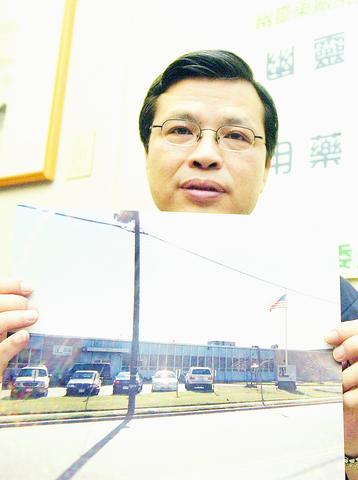As Taiwan prepares to enter the WTO, stricter regulations on imported medications are needed to prevent disqualified pharmaceutical manufacturers from selling drugs even after their operations overseas are closed down, a DPP lawmaker said yesterday.
Due to a lack of clear regulations regarding the extension of drug certificates, drugs with false certificates can often be found in the market. This situation will deteriorate when Taiwan is admitted to the WTO and more drugs come onto the market, according to DPP Legislator Chang Ching-fang (張清芳).

PHOTO: GEORGE TSORNG, TAIPEI TIMES
By law, certificates are required for any drugs that are imported into Taiwan, Chang said, and to protect consumers, tight regulations are applied on issuing certificates for new medicines. But in contrast, he said, extensions for expiring certificates are not scrutinized closely enough.
The lack of an effective evaluation process has cast doubt on at least 60 drug certificates among more than 10,000 on the market, and it is also common knowledge that one certificate is often used for many different kinds of medicine. In addition, certificates and drugs are sometimes found to be mismatched, the lawmaker said.
While Chang commended the Department of Health for enforcing stricter controls on issuing certificates for new medicine, the lawmaker lashed out at the bureau's assessment procedures regarding the extension of old ones.
Under current practice, foreign pharmaceutical producers intending to renew their existing certificates need only present approval from two places -- one from the health department of the country of the manufacturer, the other from that country's Taiwanese embassy or representative office.
Certificates will be renewed as long as the written documents are submitted, and investigations are not carried out to verify the credibility of these papers, or the quality of these manufacturers' goods.
The lawmaker gave one example to reveal the severity of the issue. He said that Ford Laboratory, a pharmaceutical factory located in New Jersey, no longer exists, but is still selling drugs in Taiwan with valid certificates.
According to information provided by the Board of Foreign Trade's office, stationed in the US, Ford Laboratory was forced to shut down in 1995 due to tax evasion. But according to records of the Department of Health, the manufacturer still has 10 valid certificates in Taiwan, and eight of them were approved for extension between 1998 and 1999, Chang said.
Chien-min (
Responding to the lawmaker's censure, Hu Yoa-pu (
"If [the agent] fails to provide a reasonable account within a month, we will order the questionable products be taken off the shelf," the official said. "But it is still within the one-month grace period, therefore the selling of Ford Laboratory products is still legal."

Conflict with Taiwan could leave China with “massive economic disruption, catastrophic military losses, significant social unrest, and devastating sanctions,” a US think tank said in a report released on Monday. The German Marshall Fund released a report titled If China Attacks Taiwan: The Consequences for China of “Minor Conflict” and “Major War” Scenarios. The report details the “massive” economic, military, social and international costs to China in the event of a minor conflict or major war with Taiwan, estimating that the Chinese People’s Liberation Army (PLA) could sustain losses of more than half of its active-duty ground forces, including 100,000 troops. Understanding Chinese

The Ministry of Foreign Affairs (MOFA) yesterday said it is closely monitoring developments in Venezuela, and would continue to cooperate with democratic allies and work together for regional and global security, stability, and prosperity. The remarks came after the US on Saturday launched a series of airstrikes in Venezuela and kidnapped Venezuelan President Nicolas Maduro, who was later flown to New York along with his wife. The pair face US charges related to drug trafficking and alleged cooperation with gangs designated as terrorist organizations. Maduro has denied the allegations. The ministry said that it is closely monitoring the political and economic situation

UNRELENTING: China attempted cyberattacks on Taiwan’s critical infrastructure 2.63 million times per day last year, up from 1.23 million in 2023, the NSB said China’s cyberarmy has long engaged in cyberattacks against Taiwan’s critical infrastructure, employing diverse and evolving tactics, the National Security Bureau (NSB) said yesterday, adding that cyberattacks on critical energy infrastructure last year increased 10-fold compared with the previous year. The NSB yesterday released a report titled Analysis on China’s Cyber Threats to Taiwan’s Critical Infrastructure in 2025, outlining the number of cyberattacks, major tactics and hacker groups. Taiwan’s national intelligence community identified a large number of cybersecurity incidents last year, the bureau said in a statement. China’s cyberarmy last year launched an average of 2.63 million intrusion attempts per day targeting Taiwan’s critical

AGING: As of last month, people aged 65 or older accounted for 20.06 percent of the total population and the number of couples who got married fell by 18,685 from 2024 Taiwan has surpassed South Korea as the country least willing to have children, with an annual crude birthrate of 4.62 per 1,000 people, Ministry of the Interior data showed yesterday. The nation was previously ranked the second-lowest country in terms of total fertility rate, or the average number of children a woman has in her lifetime. However, South Korea’s fertility rate began to recover from 2023, with total fertility rate rising from 0.72 and estimated to reach 0.82 to 0.85 by last year, and the crude birthrate projected at 6.7 per 1,000 people. Japan’s crude birthrate was projected to fall below six,